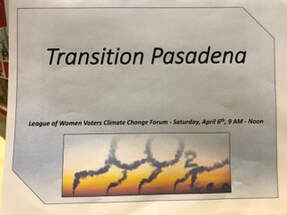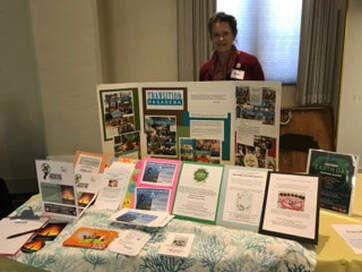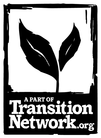Transition Pasadena is part of the global Transition movement that came into being out of a dedication to fight climate change and develop ways to adapt to its outcomes. Transitions are inevitable; but how will we endure them along the way? The more effectively we anticipate changes and prepare for them, the more comfortable the transitions will be.
One example of the work of Transition Pasadena is the Throop Learning Garden where we grow food in partnership with Throop UU Church. True, right now we can get our food from the grocery store, but what if there was suddenly no more gas? The food would stop arriving via trucks from the Central Valley and beyond, and we would have to find it closer to home. In such a dramatic situation, Throop Learning Garden’s existence would mean that some food would be available.
Another brainchild is the Repair Café Pasadena, which, along with building community, is about keeping objects out of the landfill -- which is a symptom of our throwaway society. Again, if there are no trucks and no gas to fuel them, the flow of consumable items to stores is halted; so we had better learn how to fix things instead of tossing them! Why not start now? Decreasing consumerism helps climate too. Repair Cafe is an example of the gift economy at work, by volunteers fixing and mending things that would otherwise be discarded.
Pasadena 100 is about fighting climate change through activism at City Hall. The goal of Pasadena 100 was to convince the city to move towards 100% renewable energy by 2035. They came close -- but they did agree to two other initiatives: first, no more long-term fossil fuel contracts, and second, to include the social cost of carbon when doing their calculations on where to best source our energy.
One of our early projects was the Cool Roofs campaign which successfully influenced the city to give rebates to citizens who add cool roofs (which reduce the urban heat island effect.)
Council is about establishing trust and learning communication techniques and practicing them. These are skills we need to continue to build community networks essential to coping with stressful times. Storytelling and deep listening are our tools.
The Beautiful Bioswales project in partnership with Pasadena Complete Streets Coalition is about capturing storm water to keep green spaces thriving. Since climate change in California has created more drought and more ‘strong storm’ events, capturing storm water is an adaptation that will reduce soil erosion and increase lush landscapes. The goal is the establishment of more bio swales in public and private spaces.
AltaPasa Green Circle is about going plastic free. The elimination of fossil fuels means less or no plastic. We are practicing for the future; and, every time we refuse to buy plastic we are changing the market with our dollars. Altadena’s Wednesday Farmers Market hosts Green Circle making fabric bags, sharing plastic free dining, and raising Zero Waste consciousness.
A 100% California native garden was planted and is maintained by neighbors at Pasadena’s Jackie Robinson post office. Establishing native landscapes is important for biodiversity because climate change is rapidly altering the quality and location of habitat for pollinators, bugs, birds and critters, which are suffering as a result.
Mulch for the People is about building soil more effectively by getting more mulch to more people more easily. Better soil creates healthier plants and plants sequester carbon; another way to fight climate change. It also keeps mulch out of the dump where it causes methane, a greenhouse gas.
Pasadena environmental advocates is a collaboration of multiple groups that meets bi-monthly at Eco-breakfast. Participants and guests of the many local environmental organizations network, brainstorm and collaborate on short-term bursts of activism. The needs range from fighting climate change to various ways of working towards adaptations. Many projects spring from the synergy achieved at these meetings.
Piano à la cart is a project linking eco-friendly transportation – in this case, bicycle riding -- and the gift of music. By transporting his piano around town on a cart strapped to his bicycle, David Cutter is a one-person climate change force of nature! And, playing music in public is a delightful example of the gift economy – the free expression of art prompting others to share their creative gifts as well.
From native plants to cool roofs, from music to mulch, Transition Pasadena has been fighting climate change and building community inside City Hall and out in the environment for nearly 10 years. The progress continues through the gifts and efforts of long-term as well as newly recruited volunteers. The danger of climate change is real, but the efforts to combat it are powerful too!
We are online at TransitionPasadena.org
---Sylvia Holmes, Therese Brummel, Frances Fitzgerald






